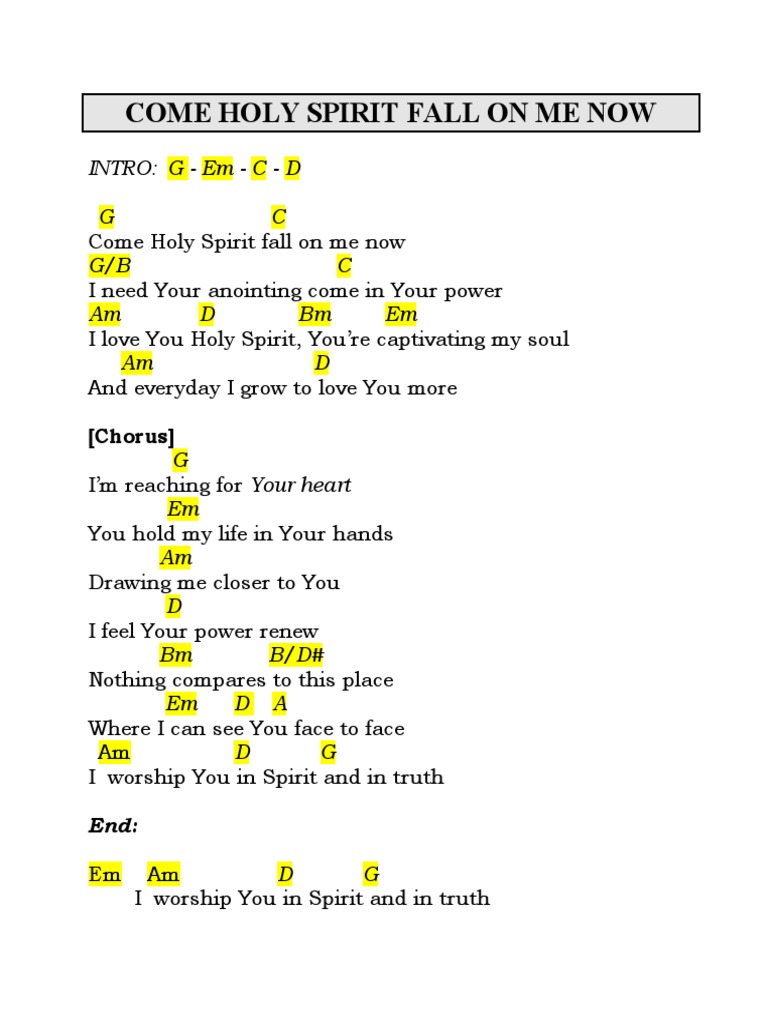In the realm of contemporary Christian worship, the invocation of the Holy Spirit often serves as a profound catalyst for spiritual rejuvenation and transformative experiences. One such stirring composition is “Holy Spirit Come to Me” by Julie Hoy, a piece that resonates deeply with congregants and individuals alike. This song encapsulates the essence of yearning for divine presence, delineating an intricate tapestry of emotion, conviction, and spiritual surrender. The lyrics not only convey a heartfelt plea for the Holy Spirit’s intervention but also encourage reflective thought among believers regarding their own spiritual journeys.
The lyrics of “Holy Spirit Come to Me” depict a passionate appeal for the Spirit’s arrival. They are rich in imagery, enveloping the listener in a meditative state that invites the Holy Spirit to permeate both personal and collective worship experiences. The phraseology espoused by Hoy beckons to a deeper understanding of the Holy Spirit as a comforting presence, a gentle guide who stirs the hearts and minds of believers to seek righteousness and embrace divine love.
What might it mean, then, to invite the Holy Spirit into one’s life? This question is foundational and poses a delightful challenge: How do we make room for the divine within our daily existence? Does inviting the Holy Spirit require a profound metamorphosis in our habits, thoughts, and interactions with others? It seems not merely an act of verbal invocation, but rather a commitment to living out one’s faith with authenticity and integrity.
To dissect the lyrical composition further, it is essential to consider the structure and substance of the song. The refrain, often echoing the need for the Spirit’s guidance, serves as a tangible reminder of dependence on a power greater than oneself. The repetition of phrases emphasizes a longing not merely for a moment of emotional high but for a sustained relationship with God through the workings of the Holy Spirit. This appeal underscores the underlying Christian conviction that human beings are inherently limited without divine assistance, necessitating an openness to the supernatural. Moreover, the lyrics beckon believers to embrace vulnerability—an essential step towards receiving the Holy Spirit.
When examining the impact of the song within a worship context, its potency cannot be overstated. Layered harmonies and evocative melodies weave together to create an atmosphere conducive to deep worship. The music itself acts as a conduit for the Holy Spirit, encouraging congregational engagement and fostering a collective yearning for divine presence. As individuals sing the words, they are simultaneously engaging in a communal act of seeking, which galvanizes the congregation as a whole. Herein lies a vital aspect of worship: the power of collective prayer and the elevation of spirits that occurs when believers unite in a shared desire for divine encounter.
Furthermore, consider the theological implications of inviting the Holy Spirit into one’s life. Throughout the New Testament, the Holy Spirit is portrayed as the Comforter, Advocate, and Guide. Each role beckons believers to a more profound engagement with their faith. When individuals sing, “Holy Spirit come to me,” they are not merely requesting comfort but are also embracing the transformative role of the Spirit. This act of faith embodies a holistic integration of spirit, mind, and body, calling for the entirety of one’s being to align with divine purposes.
But is it enough to only ask for the Holy Spirit’s presence? One might ponder: Is there not an active participation required on our part? The lyrics suggest more than a passive acceptance; they allude to a hunger that drives the believer to seek out acts of kindness, love, and servitude in the world. This interplay between divine assistance and human agency raises important questions within the Christian community. Are we becoming mere recipients of grace while neglecting our responsibilities toward one another, or are we mudding the waters of our faith with complacency? This song challenges believers to consider the implications of their requests—how do we allow the Holy Spirit to move through us and guide our actions in the world?
When considering personal applications, “Holy Spirit Come to Me” serves as a poignant reminder of the need for ongoing spiritual freshening. As believers, clarity of purpose can falter in the mundane rhythms of everyday life, and the desire for divine guidance becomes sometimes overshadowed. Thus, this song acts as both a call to action and an invitation to reflection. Returning to its lyrics can reignite an ardent desire to prioritize spiritual engagement, instigating a renewed determination to welcome the Holy Spirit into the crevices of our lives, making space for transformation.
In conclusion, Julie Hoy’s “Holy Spirit Come to Me” emerges not only as a musical expression of longing but also as a theological affirmation of the need for divine presence. By dissecting its lyrical meaning and worship impact, we unlock profound insights into what it truly means to invite the Holy Spirit into our lives. As we ponder the questions posed and embrace the challenges suggested, we learn that the journey of faith is ongoing. It calls for openness, vulnerability, and an unwavering commitment to embody the Spirit’s work in the world. Ultimately, this song serves as both a personal and communal anthem, heralding the invitation to engage in the vibrant, transformative flow of the Holy Spirit, which can profoundly reshape our lives and the world around us.



